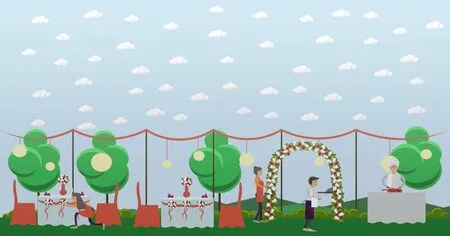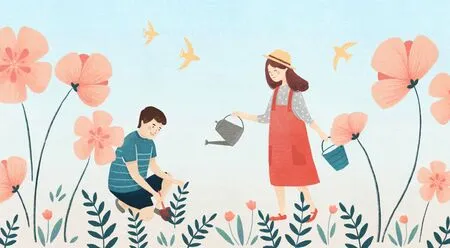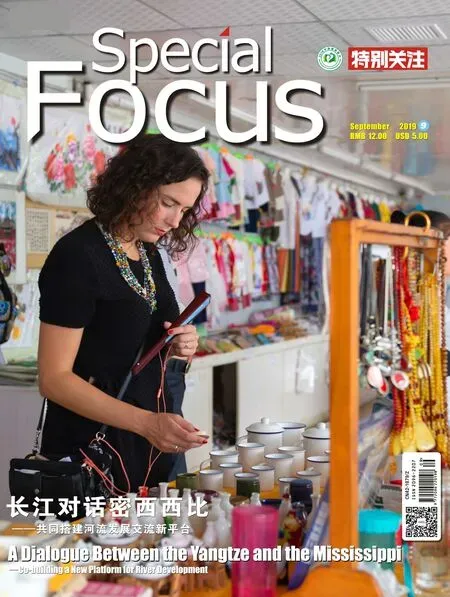A Good Life Is Not Necessarily Expensive
2019-10-10ByWangXiang
By Wang Xiang
Living in Hong Kong, a metropolis famous for being expensive, Mo Haoguang's family of three haven't purchased any clothes for 13 years and live on monthly expenses of only 2,000 HK dollars (equal to about 250 US dollars). It may sound impossible, yet they live a happy and joyful life. For them, a good life does not have to be expensive at all.
Going Green with Aniu
Born and raised in Hong Kong, Mo Haoguang's student life was no different from most young people. He liked to watch TV at home, play games, eat takeaway, and go online shopping, generating a lot of garbage on a daily basis.
At the age of 16, Mo Haoguang saw on TV that Hong Kong's landfills would soon be full, and the city was facing a severe problem of urban garbage. Mo Haoguang was shocked and started feeling guilty for being one of those generating massive amounts of garbage.
After that, Mo Haoguang began to pay attention to environmental protection. In 2004, he graduated from the Department of Education at the University of Hong Kong and continued to pursue his master's degree at Hong Kong Baptist University. There he joined an environmental organization and worked with volunteers every day to study more natural lifestyles with low-consumption. He made the decision to live a green life, stop buying new clothes, take public transportation all the time, and move to the outskirts of the city. His girlfriend could not accept his life philosophy and broke up with him.

13年来没有买过一件衣服,一家三口每月开销只有2000港元。这在物价极高的香港几乎是不可能的事,但莫皓光一家三口过得其乐融融。对他们来说,好的生活,一点都不贵。
遇见志同道合的她
莫皓光是土生土长的香港人。读书时,他的生活方式跟其他年轻人没什么不同,假期喜欢窝在家里看电视、打游戏、吃外卖、网购,每天制造很多垃圾。
16岁那年,莫皓光偶然在电视上看到一则新闻,说香港的垃圾填埋场将很快饱和,城市垃圾问题严峻。莫皓光十分震惊,他忽然觉得很愧疚,自己就是海量垃圾的制造者。
从那时起,莫皓光开始关注环保。2004年,莫皓光从香港大学教育系毕业,进入香港浸会大学攻读硕士。在那里,他参加了一个环保组织,每天跟志愿者们一起研究低耗、自然的生活方式。他决定过绿色生活,不再买新衣,乘坐公共交通工具,还打算搬到郊外去住。因为接受不了他的生活理念,当时的女朋友跟他分了手。
世界文明之旅活动推动了校园文化的创建和中外文化交流,并在读书主题引导、阅读兴趣培养、各国文化交流等各个方面均起到了积极作用,真正实现了全方位的图书馆与读者的双向互动与交流,并在此过程中引领了校园文化建设,得到了广大读者的积极评价与反馈。
Later Mo Haoguang met Aniu, a girl in his environmental protection course. Like Mo Haoguang, Aniu also advocated a simple and natural way of life. They explored a green life together, climbing mountains, camping, and learning to make pure natural cleaning products. They shared the same interests and had a lot in common.
In 2007, Mo Haoguang graduated with a master's degree. Instead of applying for a high-paying job like his classmates, he found an easy job, which doesn't pay high salary, but enough for them to maintain a simple life. Meanwhile, he got to spend more time with Aniu.
Less Money, More Romance
In 2012, Mo Haoguang and Aniu decided to get married. They planned an environmentally friendly yet joyful and romantic wedding.
They rented a venue at a countryside school and chose to have their wedding in the afternoon, when the sunlight was soft and there was a gentle breeze. Therefore, no lights or air conditioning were needed. The floor was covered with petals and leaves collected by friends from nearby, making a simple and stylish venue. Instead of a caravan of cars, Mo Haoguang and his relatives and friends went to Aniu's home to pick her up by bus. The groom's suit was borrowed and the bride's wedding dress was made with white cloth by a friend. The couple made their wedding rings out of grass. At the wedding, the two young people solemnly exchanged their rings, which were buried in the soil the second day and returned to nature.
All the dishes at the wedding were cooked by Mo Haoguang's friends and all the tableware were brought by guests themselves. Everyone had a good time. The newly-weds took no red envelopes (monetary gifts), so all the wedding gifts given by friends were green: selfplanted vegetables, organic rice, handmade soap, leaf puzzles... everything was full of creativity. More than 300 guests were invited, making it a grand and fun occasion, yet the total costs add up to no more than 20,000 HK dollars (less than 2600 US dollars). Following their example, many friends emulated their wedding later on.

后来,莫皓光在一次环保课程上遇见女孩阿牛。和莫皓光一样,阿牛也崇尚简单自然的生活方式。他们一起登山,露营,学习制作纯天然的清洁用品,体验绿色生活,两人志同道合。
2007年,莫皓光硕士毕业,他没有像其他同学一样去应聘高薪工作,而是找了一份轻松的工作。月薪不高,但足够维持简单的生活,他还拥有了更多陪伴阿牛的时间。
浪漫不打折
2012年,莫皓光和阿牛决定结婚。两人筹划了一场既贯彻环保自然理念又营造出婚礼喜悦和浪漫的婚礼。
他们租了一所乡村学校的场地,选择下午时间办婚礼,此时阳光柔和,清风吹拂,既不需要灯光,也不需要空调。现场铺满了朋友们从附近收集来的花瓣和树叶,简单又不失格调。没有迎亲车队,莫皓光和亲友一起乘坐巴士去阿牛家接亲,他穿了一套借来的中山装当礼服,阿牛则身穿朋友用白布制作的婚纱。至于婚戒,则是两人一起用草编的。在婚礼上,两人郑重交换了对戒,隔日又将它们埋到了泥土里,让其回归大自然。
婚后,莫皓光和阿牛住在乡下,在屋子旁边辟出一块地自己种菜。他们从未买过新衣,穿的都是朋友送的二手衣。如果非要去超市买食物,那就选临近过期的特价品,避免食物被浪费。家中没有电视和空调,每月只需缴纳很少的电费,家具都是二手或自制的。夫妻俩还学会了自制环保酵素,配合茶籽粉去污。
因为开销小,莫皓光几乎没有任何经济压力,幸福指数越来越高。他说:“身边好多朋友在城市工作了大半辈子,都想归隐田园,我觉得他们很傻,既然田园生活那么好,为什么不一开始就过呢?”
最好的不一定最贵
2016年,儿子麦皮出生。人人都说养小孩很贵,因为父母总想把最好的都给孩子,但莫皓光和阿牛认为,最好的不一定是最贵的。
麦皮的玩具大部分是二手玩具。莫皓光过段时间就会跟同样支持环保的朋友交换玩具。不花钱,还能让儿子玩上不同的玩具。
莫皓光还经常为儿子制作玩具。他用木头在院子里做了一架秋千,还将一辆破旧的小推车改装成婴儿车。车子的前面是麦皮的专属座椅,后面则用来装货,每次麦皮坐在推车上,都会乐得咯咯大笑。
After getting married, Mo Haoguang and Aniu still lived in the countryside. They cleared some land next to their house to grow vegetables. They wear second-hand clothes given to them by friends and haven't bought any new clothes. When they have to go shopping, they choose expiring specials in the supermarket to avoid food wastage. There is no TV or air conditioning in the house, so their monthly electric bill is very little. All their furniture is second-hand or hand-made. The couple also learned to make environmentally friendly enzymes, which, combined with tea seed powder, makes a good cleaning product.
With such a small expenses, Mo Haoguang feels next to zero economic pressure and enjoys a high happiness index. He said: “A lot of my friends work in the city for most of their lives, saying they want to return to pastoral life when they are older. I find it silly, since if the pastoral life is so good, why not live it now?”
The Best Is Not Necessarily the Most Expensive
In 2016, their son, Maipi, was born. Everyone says that raising children is expensive because parents always want the best for their children. Mo Haoguang and Aniu believe that the best is not necessarily the most expensive.
Most of Maipi's toys are second-hand, obtained by exchanging toys with friends who also support environmental protection. Not much money is needed here, while the child can have various toys to play with.
Mo Haoguang often makes toys for his son too. He made a swing in the yard out of scrap wood, and converted an old cart into a stroller. The front of the car is Maipi's exclusive seat while the back is for carrying things. Maipi always has a good laugh sitting on the cart.
Mo Haoguang and Aniu engage their son in daily family life as much as possible. They take him everywhere they go, from picking vegetables and making bread to tightening bolts, shoveling sand, and carrying water… While a naughty child might slow them down a bit, the couple feels joyful to have him.

The birth of Maipi only increased their monthly living expense by less than 100 HK dollars. Mo Haoguang works three days a week and spends the rest of his time with his wife and son. The whole family is satisfied with their life.
Mo Haoguang said: “Happiness should not be far away from us. You don't have to have a house, a car, and many things to be happy. When you have enough to support your basic needs, you can live happily.”
(FromMo Chou, May 2019. Translation: Lu Qiongyao)
莫皓光和阿牛尽可能让孩子参与家庭生活,带着他一起摘青菜、做面包、上螺丝钉、铲沙子、打水……虽然孩子调皮,会降低工作效率,但夫妻俩很开心。
有了麦皮之后,每个月的生活开销只增加了不到100港元。莫皓光每周只上三天班,其他的时间就用来陪伴太太和儿子。对于这样的生活,一家三口非常满意。
莫皓光说:“开心不应该离我们很远,并非要有房子、有车、有很多东西才开心。资源可以满足生活需求,你就可以过得很快乐。” (摘自《莫愁》2019年第5期)
